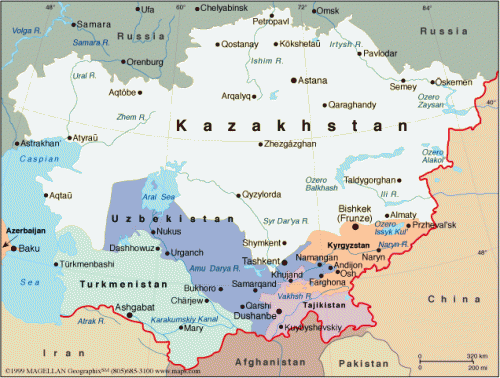mercredi, 13 février 2013
Islamic Movement of Uzbekistan: Rising Menace

Islamic Movement of Uzbekistan:
Rising Menace
|
Ex: http://www.strategic-culture.org/ |
|
The Islamic Movement of Uzbekistan (IMU) has become a concern in Eurasian region. In January 2013 alone, the members of the extremist organization confronted security forces in Afghanistan on two instances during operations in Burkah district of Baghlan province. A government official in Tajiksitan declared on 28 January 2013 that police in Kubodiyen District in Khatlon Oblast detained six suspected members of IMU in past two months, while on 26 January 2013 another IMU suspect blew himself rather than surrendering to police. The Tajik Interior Minister, Ramazon Rahimov declared last month that the Tajik security forces killed one IMU suspect and arrested nine other suspects in the country’s north. One of the commanders of IMU, Abu Zar al-Burmi, a Pakistan national of Rohingya Burmese descent, called for jihad against Myanmar. Last year Myanmar witnessed violent clashes among Rohingya Muslims and Buddhists. Reports suggest that IMU has donned a new garb Islamic Movement of Turkestan in order to camouflage it earlier image. IMU emerged aftermath of the collapse of the Soviet Union. Its main aim was to establish Sharia based state and society in Uzbekistan and other parts of Central Asia. Its founders Tahir Yuldashev and Juma Namangani aimed at establishing a caliphate comprising former Soviet Central Asia and Xinjiang region of China. They challenged Islam Karimov regime and played active roles in promoting violence. Namangani was later killed in Afghanistan, while Yuldashev has shifted base to Waziristan area of Pakistan. Central Asian states were averse to its radical ideology, but IMU found a ready acceptance in the circles of Al Qaeda and Taliban. IMU not only got shelter and sustenance in Afghanistan-Pakistan border areas, but also contributed to proliferation of violent activities of these organizations. As northern Afghanistan borders Uzbekistan and Tajikistan, it has become convenient for IMU to use porous borders and play havoc in Central Asia. Its cousins in Central Asia like Jundullah (soldiers of Allah) have recently been active in countries like Kazakhstan. Like IMU, the Jundullah has its base in border areas of Pakistan and Afghanistan… As Afghanistan has populations of ethnic Uzbek and Tajik minorities, it has become convenient for these organizations to mobilize these people. Poverty and unemployment may have contributed to this rise of radicalism, but certainly propagation of extremist ideology plays a major role. Furthermore, the combination of these Central Asian organizations with international organizations like Al Qaeda, and Af-Pak organizations like Taliban and Haqqani network make them further lethal in conducting operations. Besides fermenting terrorist activities in Central Asia and Afghanistan, these Central Asian organizations have been alleged to have bombed Pakistani cities. The departure of international forces from Afghanistan may help the war torn country to establish its own mechanisms of governance. But, it will be difficult to predict how far the indigenous government will be stable against the onslaught of the radical forces. The international forces have not been able to stem the rise of these forces. Taliban has already declared its plans of governance in its envisioned emirate of Afghanistan. In this venture of radicalization, forces like IMU come handy. Comparatively rich due to involvement in illegal poppy trade, Taliban and Haqqani network have used IMU operatives as surrogates and helpers. Reports suggest that IMU members, besides following the orders of Taliban and Haqqani, have also worked as bodyguards and helpers of top leaders of these organizations. There are also instances when members of these organizations interchange roles and perform activities for each other. If the return of the Taliban becomes an eventuality, the destructive role of IMU and Jundullah will certainly grow in Central Asia and surrounding regions. International events of extremism and terrorism can not be completely separated. Radicalization of minorities in multiethnic and pluralistic societies is a core motive of Al Qaeda which, despite trumpets of its decimation, has raised its head not only in Afghanistan, but also in other parts of the world – in Libya, Syria, Mali, Myanmar and many other regions. Al Qaeda leader Ayman al Zawahiri was a key motivator of rebel activities in Libya and Syria. The collusion of Al Qaeda and Taliban in Afghanistan may emerge a bigger challenge to countries in Eurasia. Afghanistan is situated among many fault lines, and likely resurgence of Taliban will cause more harm than good. The current policy of Taliban is to hedge against the Karzai regime and buy time till international forces depart, so that it can with support of sympathetic powers seize Kabul. In such a scenario, the morale of IMU will not be boosted psychologically, but also materially. A Taliban government will have resources and foster IMU activities in proliferating ideology of radicalism through bombs. As the IMU commander al-Burmi declared, the fire of extremism will spread like a forest fire if the Taliban returns to power. Afghanistan is surrounded by multiethnic and pluralistic states, which have ethnic based grievances. The ethnic minorities, currently under the regimes of secular democracies, will be easy targets of radical forces. The dreams of Caliphate of Turkestan or Caucasian Caliphate will be vigorously pursued with easy money coming from drug trafficking and charity money from some extremist regimes from different parts of the world. The prospects of peace and stability in Afghanistan and its border areas do not appear bright in present scenario. This brings forth the urgency of international cooperation, which at present does not appear much in sight. Unless the rise of IMU and their patrons in Afghanistan is checkmated in time, the future war against extremism and terrorism will really be long winding for the countries of Eurasia. |
00:05 Publié dans Actualité, Géopolitique, Islam | Lien permanent | Commentaires (0) | Tags : islamisme, politique internationale, islam, ouzbékistan, asie centrale, asie, affaires asiatiques, géopolitique |  |
|  del.icio.us |
del.icio.us |  |
|  Digg |
Digg | ![]() Facebook
Facebook



Les commentaires sont fermés.